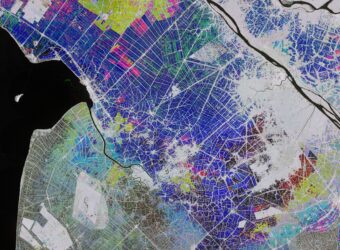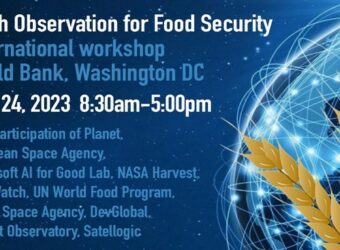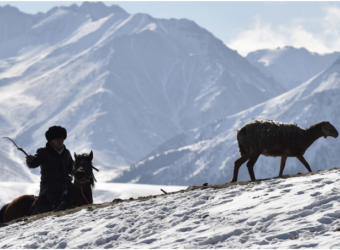Working with the World Bank, GMV as part of the European Space Agency (ESA) Global Development Assistance (GDA) Agile EO Information Development (AID) Agriculture Consortium is implementing an Earth Observation (EO) service for the enhancement of livestock production in Paraguay.
Livestock farming plays a crucial role in the agricultural landscape of Paraguay, contributing roughly 30 percent of agricultural production and about 20 percent of the agriculture sector exports. The raising of livestock historically represented more than a quarter of total land use and 80 percent of all capital investment in agriculture. It is providing livelihoods for a substantial portion of the population. In Paraguay, and elsewhere, livestock farming faces various challenges, including environmental impact, resource management, and productivity. The country also suffered from three consecutive years of La Niña conditions, which leads to dry weather in most regions.
Paraguay has a great potential for the development of a resilient and responsible livestock and agro-industrial sector. To do so however, it must overcome the inter-linked challenges of creating economic opportunities while conserving its natural resources and improving resilience to climate change. It is critical that the expansion of agro-industrial productive activities and the creation of jobs go hand in hand with sound management of Paraguay’s natural capital. In addition, the enhancement of its capacity to develop and implement a strategy for integrated management of climate change risks are all keys to securing the basis of long-term growth.
The World Bank is a key partner in Paraguay’s efforts to enhance its livestock sector, through strategic financial support and technical assistance, specifically by supporting Paraguay to implement targeted initiatives aimed at modernizing and optimizing livestock practices. Most relevant in this regard is the 110 million USD budgeted Market Access for Agricultural Products Project. Among other organizations the project supports the Federación de Cooperativas de Producción (FECOPROD).
FECOPROD, which translates to the Federation of Production Cooperatives, is a cooperative federation that represents and supports the interests of agricultural producers. One of the primary focuses of FECOPROD in the context of livestock farming is to enhance the productivity and profitability of its member cooperatives. This involves providing them with access to modern farming techniques, advanced technologies, and essential resources.
With the support of the World Bank team, GDA AID Agriculture is working with FECOPROD to improve productive decision-making in livestock farming through the coupled use of EO and local weather data. The World Bank and FECOPROD are willing to integrate the EO information services provided by GDA AID Agriculture into the digital infrastructure of FECOPROD, with a view to later exploring opportunities to jointly scale up the solutions developed, providing reliable and timely data for:
Resource Management: EO derived vegetation condition and biomass estimations are integrated with livestock farming practices and farm productivity records. This is used to optimize grazing areas, monitor water availability, and prevent overgrazing, which leads to improved resource management and reduced environmental impact.
Pasture Condition Assessment: Earth observation is used to assess pasture conditions and to monitor vegetation health. By analyzing satellite imagery, coupled with local data from field experiments, the farmer gets vital information about the quality of the pasture, ensuring that livestock receive optimal nutrition. This approach enhances animal health, productivity, and overall farm efficiency.
Efficient Feed Management: Earth observation data is key in assessing pasture health and predicting biomass production over large areas. The systematic production of these indicators allows the optimization of feed production by aligning it with pastures’ seasonal cycles, ensuring a stable and cost-effective supply of feed for livestock. This approach enhances overall farm efficiency while minimizing the environmental impact associated with feed production.
Climate Resilience and Adaptation: Climate data records and weather observations are produced to allow farmers anticipate weather patterns and mitigate the impact of extreme conditions. This information is key for making informed decisions on animal health, feed management, and shelter planning. Having timely data, livestock farmers can adapt their practices to changing climates, enhancing resilience and sustainability
Map and chart showing biomass estimates in the study area (2020 – 2023)
Earth Observation services leverage the enhancement of Data-Driven Decision-Making. Integrating Earth Observation into livestock farming, together with the current services in place, promotes data-driven decision-making. Similar to other agricultural production sectors, livestock farmers are getting access to a wealth of information, from weather forecasts to land conditions, which enables them to make informed choices about breeding, health management, and overall farm operations. This data-driven approach enhances efficiency and productivity.
In summary, the integration of Earth observation technologies into livestock farming represents a scalable solution for addressing environmental concerns, improving resource management, and enhancing the overall sustainability of the industry in Paraguay and elsewhere. As these technologies continue to advance, the potential for innovation in livestock farming practices becomes even greater, offering a path towards a more resilient and environmentally conscious agricultural future.
The World Bank GDA AID Agriculture and FECOPROD are teaming up to explore opportunities, based on the project results, foster the uptake of EO services to improve livestock production in Paraguay or other parts of Latin America.









